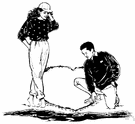describe
Also found in: Thesaurus, Medical, Legal, Financial, Idioms, Encyclopedia, Wikipedia.
de·scribe
(dĭ-skrīb′)tr.v. de·scribed, de·scrib·ing, de·scribes
1. To give an account of in speech or writing: describe a sea voyage.
2. To convey an idea or impression of; characterize: She described her childhood as a time of wonder and discovery.
3. To represent pictorially; depict: Goya's etchings describe the horrors of war in grotesque detail.
4. To trace the form or outline of: describe a circle with a compass.
[Middle English describen, from Latin dēscrībere, to write down : dē-, de- + scrībere, to write; see skrībh- in Indo-European roots.]
de·scrib′a·ble adj.
de·scrib′er n.
Synonyms: describe, narrate, recite, recount, relate, report
These verbs mean to tell the facts, details, or particulars of something in speech or in writing: described the accident; narrated their travel experiences; an explorer reciting her adventures; a mercenary recounting his exploits; related the day's events; reported what she had seen.
These verbs mean to tell the facts, details, or particulars of something in speech or in writing: described the accident; narrated their travel experiences; an explorer reciting her adventures; a mercenary recounting his exploits; related the day's events; reported what she had seen.
American Heritage® Dictionary of the English Language, Fifth Edition. Copyright © 2016 by Houghton Mifflin Harcourt Publishing Company. Published by Houghton Mifflin Harcourt Publishing Company. All rights reserved.
describe
(dɪˈskraɪb)vb (tr)
1. to give an account or representation of in words
2. to pronounce or label: he has been described as a genius.
3. to draw a line or figure, such as a circle
[C15: from Latin dēscrībere to copy off, write out, delineate, from de- + scrībere to write]
deˈscribable adj
deˈscriber n
Collins English Dictionary – Complete and Unabridged, 12th Edition 2014 © HarperCollins Publishers 1991, 1994, 1998, 2000, 2003, 2006, 2007, 2009, 2011, 2014
de•scribe
(dɪˈskraɪb)v.t. -scribed, -scrib•ing.
1. to tell or depict in words; give an account of: to describe an accident in detail.
2. to pronounce, as by a designating term or phrase: to describe someone as a tyrant.
3. to represent or delineate by a picture.
4. to draw or trace the outline of: to describe an arc.
[1400–50; < Latin dēscrībere=dē- de- + scrībere to write]
de•scrib′a•ble, adj.
de•scrib′er, n.
Random House Kernerman Webster's College Dictionary, © 2010 K Dictionaries Ltd. Copyright 2005, 1997, 1991 by Random House, Inc. All rights reserved.
describe
The verb describe can be used either with a direct object or with a wh-clause.
1. used with a direct object
When you describe someone or something, you say what they are like.
Can you describe your son?
You can use describe with a direct object and an indirect object. The direct object goes first.
He described the murderer in detail to the police officer.
She described the feeling to me.
2. used with a wh-clause
Describe can be used in front of various kinds of wh-clause.
The man described what he had seen.
He described how he escaped from prison.
You can use describe with an indirect object and a wh-clause. The indirect object goes first.
I can't describe to you what it was like.
I described to him what had happened in Patricia's house.
Be Careful!
When you use describe with an indirect object, you must put to in front of the indirect object. Don't say, for example, 'She described me the feeling' or 'I can't describe you what it was like'.
Collins COBUILD English Usage © HarperCollins Publishers 1992, 2004, 2011, 2012
describe
Past participle: described
Gerund: describing
| Imperative |
|---|
| describe |
| describe |
Collins English Verb Tables © HarperCollins Publishers 2011
ThesaurusAntonymsRelated WordsSynonymsLegend:
Switch to new thesaurus
| Verb | 1. | describe - give a description of; "He drew an elaborate plan of attack" represent - describe or present, usually with respect to a particular quality; "He represented this book as an example of the Russian 19th century novel" delineate - describe in vivid detail |
| 2. |  describe - to give an account or representation of in words; "Discreet Italian police described it in a manner typically continental" describe - to give an account or representation of in words; "Discreet Italian police described it in a manner typically continental"inform - impart knowledge of some fact, state or affairs, or event to; "I informed him of his rights" | |
| 3. |  describe - make a mark or lines on a surface; "draw a line"; "trace the outline of a figure in the sand" describe - make a mark or lines on a surface; "draw a line"; "trace the outline of a figure in the sand"mark - make or leave a mark on; "the scouts marked the trail"; "ash marked the believers' foreheads" construct - draw with suitable instruments and under specified conditions; "construct an equilateral triangle" inscribe - draw within a figure so as to touch in as many places as possible circumscribe - draw a line around; "He drew a circle around the points" circumscribe - to draw a geometric figure around another figure so that the two are in contact but do not intersect draw - engage in drawing; "He spent the day drawing in the garden" draw - represent by making a drawing of, as with a pencil, chalk, etc. on a surface; "She drew an elephant"; "Draw me a horse" write - mark or trace on a surface; "The artist wrote Chinese characters on a big piece of white paper"; "Russian is written with the Cyrillic alphabet" | |
| 4. | describe - identify as in botany or biology, for example |
Based on WordNet 3.0, Farlex clipart collection. © 2003-2012 Princeton University, Farlex Inc.
describe
verb
1. relate, tell, report, present, detail, explain, express, illustrate, set out, specify, chronicle, recount, recite, impart, narrate, set forth, give an account of, put in words We asked her to describe what she had seen.
Collins Thesaurus of the English Language – Complete and Unabridged 2nd Edition. 2002 © HarperCollins Publishers 1995, 2002
describe
verbThe American Heritage® Roget's Thesaurus. Copyright © 2013, 2014 by Houghton Mifflin Harcourt Publishing Company. Published by Houghton Mifflin Harcourt Publishing Company. All rights reserved.
Translations
يَصِفيَصِفُيُعَرِّفُ نَفْسَه إنَّه
popsatvydávat secharakterizovat
beskrivebetegnekaldeskildre
kirjeldama
kuvaillakuvata
opisati
ecsetelleír
lÿsasegjast vera; lÿsa sjálfum sér sem
記述する
묘사하다
aprašymasnusakymaspapasakojimaspapasakoti
aprakstītattēlotuzskatīt
povedať
opisati
beskriva
อธิบาย
mô tả
describe
[dɪsˈkraɪb] VT1. [+ scene, person] → describir
describe him for us → descríbenoslo
the feeling is impossible to describe → la sensación es indescriptible
she describes herself as an executive → se define como una ejecutiva
I wouldn't describe her as a feminist → no la calificaría de or describiría como feminista
describe him for us → descríbenoslo
the feeling is impossible to describe → la sensación es indescriptible
she describes herself as an executive → se define como una ejecutiva
I wouldn't describe her as a feminist → no la calificaría de or describiría como feminista
2. (Geom) [+ circle] → describir
Collins Spanish Dictionary - Complete and Unabridged 8th Edition 2005 © William Collins Sons & Co. Ltd. 1971, 1988 © HarperCollins Publishers 1992, 1993, 1996, 1997, 2000, 2003, 2005
describe
[dɪˈskraɪb] vt → décrireto describe how ... → décrire comment ..., décrire de quelle manière ...
to describe what ... → décrire ce que ...
to describe sth to sb → décrire qch à qn
to describe sb to sb → décrire qn à qn
to describe sth as → qualifier qch de
She described the meeting as very productive → Elle a qualifié la réunion de très productive.
to describe sb as → décrire qn comme
to be described as → être décrit(e) comme
to describe o.s. as sth → se qualifier de qch
They describe themselves as liberals → Ils se qualifient de libéraux.
Collins English/French Electronic Resource. © HarperCollins Publishers 2005
describe
vt
(= give description of) → beschreiben, schildern; describe him for us → beschreiben Sie ihn uns (dat); which cannot be described → was unbeschreiblich ist; to describe oneself/somebody as … → sich/jdn als … bezeichnen; he describes himself as an intellectual → er bezeichnet sich als Intellektueller; the police describe him as dangerous/a terrorist → die Polizei bezeichnet ihn als gefährlich/(einen) Terroristen; he is described as being tall with short fair hair → er wird als groß mit kurzen blonden Haaren beschrieben
(Math) → beschreiben
Collins German Dictionary – Complete and Unabridged 7th Edition 2005. © William Collins Sons & Co. Ltd. 1980 © HarperCollins Publishers 1991, 1997, 1999, 2004, 2005, 2007
describe
[dɪsˈkraɪb] vt → descriveredescribe him for us → descrivicelo
she describes herself as a teacher → dice di essere insegnante
Collins Italian Dictionary 1st Edition © HarperCollins Publishers 1995
describe
(diˈskraib) verb1. to give an account of in words; to tell in words what something or someone is like. He described what had happened; Would you describe her as beautiful?
2. to say that one is something. He describes himself as a salesman.
deˈscription (-ˈskrip-) noun1. (an) act of describing. I recognized him from your description.
2. an account of anything in words. He gave a description of his holiday.
3. a sort or kind. He carried a gun of some description.
to describe (not describe about) a scene.
Kernerman English Multilingual Dictionary © 2006-2013 K Dictionaries Ltd.
describe
→ يَصِفُ popsat beskrive beschreiben περιγράφω describir kuvailla décrire opisati descrivere 記述する 묘사하다 beschrijven beskrive opisać descrever описывать beskriva อธิบาย betimlemek mô tả 描述Multilingual Translator © HarperCollins Publishers 2009
describe
vt. describir, narrar.
English-Spanish Medical Dictionary © Farlex 2012
describe
vt describirEnglish-Spanish/Spanish-English Medical Dictionary Copyright © 2006 by The McGraw-Hill Companies, Inc. All rights reserved.